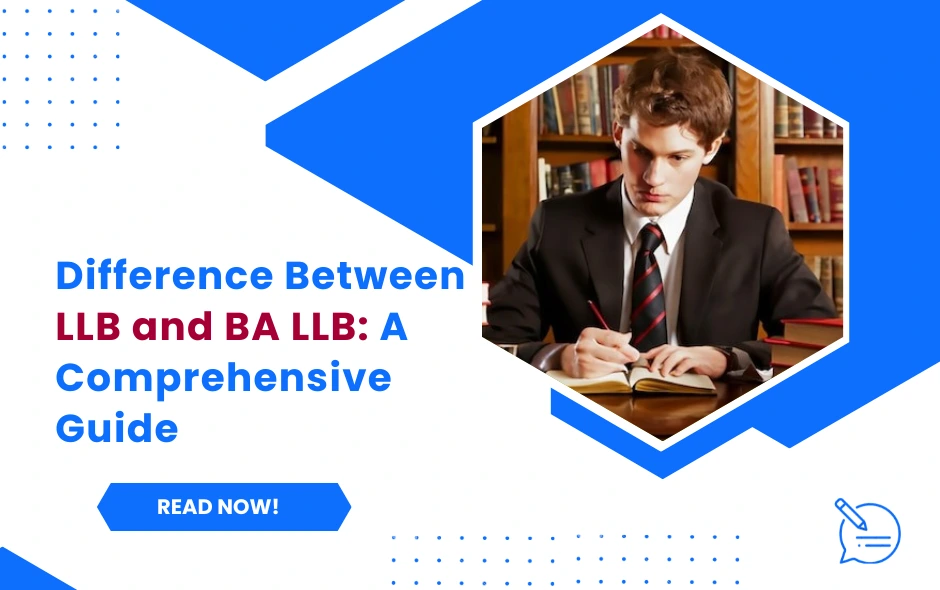BA LLB Course Details, Fee, Eligibility, Scope
Are you looking for BA LLB Course Details in depth? This blog is for you.
In movies, you might have witnessed court scenes, lawyers wearing black suits and arguing in front of a judge for their clients. The blog will help you make an informed decision. Law or legal studies are part of everyone’s life as society is governed by the law. Every individual comes across law-related issues that span several areas, including business, economics, environment, politics, trade, and human rights.
Universities and colleges offer multiple courses that help students prepare for not only making a career in law but for an array of professional positions. A student can pursue a Doctor of Philosophy (PhD) in law. After passing Class XII, a student can opt for an undergraduate course, which is BA LLB, and then a postgraduate program.
What is the BA LLB Program?
The BA LLB course is a five-year integrated course, which helps students become familiar with the legal system and gain a detailed understanding of humanities and social sciences. The full form of the course is Bachelor of Arts and Bachelor of Legislative Law, and students can pursue it after Class XII.
BA LLB Admission Process
Eligibility
Students must pass Class XII with at least 50% marks from a recognized board. Certain universities may have subject-specific requirements, such as English or Mathematics.
Entrance Exams
Admission to the BA LLB course is generally based on entrance exams. The Common Law Admission Test (CLAT) and the All India Law Entrance Test (AILET) are the most commonly accepted national-level entrance exams. State-level entrance tests may also be required for admission to state universities.
BA LLB Subjects and Syllabus
The BA LLB integrated program is conducted over five years and divided into 10 semesters. While law subjects generally remain consistent, art subjects may differ based on the institution's specialization. The program provides insight into the legal system, making students proficient in law and developing problem-solving skills.
Yearly Subjects
| Year | Subjects |
|---|---|
| First Year | Introduction to Law, Constitutional Law, Criminal Law, Political Science, Economics, and Legal Methods |
| Second Year | Administrative Law, Contract Law, Jurisprudence, Sociology, English, History, and Legal Research |
| Third Year | Corporate Law, Labour Law, Property Law, and Tort Law |
| Fourth Year | Environmental Law and Intellectual Property Law |
| Fifth Year | Advanced Law Subjects, Electives, and Practical Training (Dissertation/Project) |
BA LLB Specialization
The major LLB program lays a strong legal foundation, but several institutions provide options for specialization.
| Specialization | Details |
|---|---|
| Corporate Law | Focuses on the legal framework governing businesses, including mergers, acquisitions, and corporate governance. |
| Tax Law | Involves studying taxation policies, enforcement, and legal regulations related to taxes. |
| Criminal Law | Deals with prosecuting and defending individuals accused of crimes. |
| Intellectual Property Law | Focuses on the protection of copyrights, trademarks, patents, and trade secrets. |
| Environmental Law | Adds focus to legal issues related to environmental protection and sustainable development. |
| Labour Law | Governs the relationship between employers and employees, ensuring fair workplace practices. |
| Family Law | Handles personal disputes such as marriage, divorce, child custody, and adoption. |
| Human Rights Law | Protects fundamental rights and freedoms of individuals. |
| International Law | Governs relationships between nations, dealing with treaties and diplomatic relations. |
| Constitutional Law | Focuses on the study and interpretation of the constitution. |
BA LLB Scope
As a law graduate, you will develop a deep understanding of complex societal issues and handle these under the legal framework.
BA LLB Career Prospects
One of the most significant aspects of the BA LLB course is the wide range of career opportunities it offers.
| Job | Description |
|---|---|
| Legal Profession | Graduates can work as lawyers in law firms, government bodies, or independently. |
| Judiciary Services | Graduates can pursue a career in the judiciary by passing the judicial services exam to become a judge. |
| Civil Services | Law graduates can appear for the UPSC civil services exam for roles like IAS, IPS, and IRS officers. |
| Legal Research and Academics | Higher studies can lead to careers as legal researchers or academicians. |
| Corporate Sector | Many law graduates work as legal advisors or consultants in the corporate sector. |
| Legal Process Outsourcing (LPO) | Employment opportunities in LPO firms offering services like document review and contract drafting. |
| Alternative Dispute Resolution | Graduates can work as mediators or arbitrators. |
| Legal Journalism and Legal Writing | Work as legal correspondents or journalists covering legal news. |
| Entrepreneurship and Legal Start-ups | Some graduates start their own law firms or legal consultancy services. |
BA LLB Internship and Practical Training
To gain expertise in law, it’s essential to have in-depth practical and theoretical knowledge. BA LLB integration courses often include internships and practical training, helping students develop professional contacts and skills.
BA Fee Structure
The fees for BA LLB integration courses vary by institution. Government colleges generally have lower fees, up to Rs 2 lakh, while private colleges may charge between Rs 2 lakh and Rs 10 lakh. Fees at reputed private institutions and national law universities can be significantly higher.
Conclusion
If you are exploring options and finding it difficult to choose a college for the BA LLB integration, consider Chandigarh Groups of College, Jhanjeri. The college offers several unique factors:
- Highly qualified faculty who stay updated with industry changes.
- A need-based curriculum enriched with real-world case studies.
- A learning environment that fosters critical thinking and ethical decision-making.
Choosing the right institute requires thorough research, considering aspects like reputation, exposure, fees, and location. It's crucial to have full knowledge of BA LLB course details to make the right decision based on your interests.
As it says, "Sky's the Limit"; there's nothing impossible for law graduates.



















